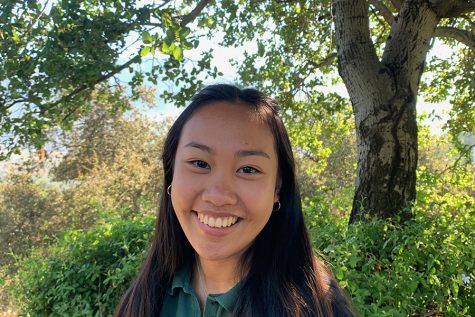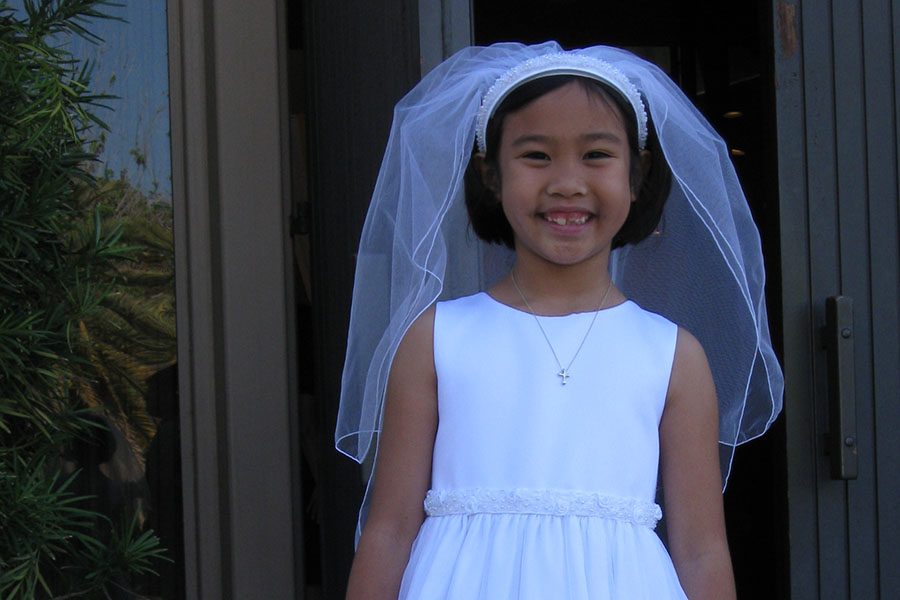Growing up Catholic in the least religious generation
The author on the day of her first Holy Communion.
I was sitting in Mass on a typical Sunday morning. I was actually altar serving that day and had a perfect view from the altar of the rest of the congregation. Getting up to give his Homily, the priest stood confidently in front of the congregation, knowing he had their undivided attention, that his words would make an impact. He had the power.
“Gen Z is the least religious generation in the world,” he said. My eyes rolled so far back into my head I could see my brain. Here we go again. If I had a dollar for every time I’ve heard about the religious decline in my generation, I’d be able to pay for college, no FAFSA needed.
Being Catholic has always been part of my identity. As an infant, I learned how to high-five, clap and do the sign of the cross. At age four, I knew the Our Father like my ABCs. Now, I go to church every Sunday at 10 a.m. I say grace before eating and wear a cross necklace around my neck. I’ve probably said the word “Amen” more times than I’ve said my actual name. My faith, at this point, is a routine.
As I’ve grown, my faith has been tested. Over the years, it’s become increasingly difficult to make “I’m Catholic” a part of my everyday vocabulary again. Since coming to Flintridge Sacred Heart and finding myself confronted by a widened range of views, my worldview has developed.
Three years into my time on the Hill, saying “I’m Catholic” suddenly feels complicated. Not all of my values line up with that statement. I arrived affirming every Catholic value, believing the Catholic Church was the beacon for all. Now, having been encouraged to seek truth and ask questions in my time on the Hill, I have come to a new understanding of the issues of sexism, LGBTQ+ oppression and child abuse in the Church. Every institution has its scandals, and these aren’t exclusive to Catholicism. But even so, saying “I’m Catholic” now feels like I am saying, “I’m ok with what has happened and what is happening now.”
It’s always been a strange thing to sit in Mass at my parish, surrounded by blonde hair and blue eyes and people who are at least triple my age. As I sat on the altar and looked out into pews full of people, I saw a sea of grey hair and not a single person of color, except for my little Filipino family of four in the back corner. And the only people I saw actively leading, ushering and participating during Mass were men.
A change I think needs to happen is a better acknowledgment of women in the Church. As a young woman who has grown up in the Church, the entity I look to when deciding what is right, when deciding what kind of person I want to be, it’s difficult to not have a woman to look up to. Instead, I have older, white men. Looking at current events and pop culture and seeing girls and women like Greta Thunberg and Alexandria Ocasio-Cortez in positions of influence and power, it’s hard to stomach the lack of inclusion of women in positions of power in the Catholic Church.
Pope Francis has made statements about the LGBTQ+ community that made waves in my congregation, especially with its conservative members. My congregation had a conniption when the Pope recognized members of the LGBTQ+ community. “Who am I to judge?” he said. I remember being in sixth grade when he made that statement, elated that the most powerful and influential figure in the Church had affirmed the lives of people that the Church had historically condemned. I later found out that, at least in my Church, even though the Pope told the LGBTQ+ community God loved them, LGBTQ marriages weren’t going to be recognized or officiated. It was like, “We love and accept you…kind of.”
Come high school, I came across the movie “Spotlight,” which is based on the Boston Globe investigative journalism team that uncovered the child abuse amongst clergy in Massachusetts and how the Church had covered it up. Seeing that movie, processing that those events really happened, turned my already crumbling Catholic world upside down. I couldn’t believe the Church would bury a scandal so large, so detrimental to the lives of its followers, while telling its congregation that they were children of God and that he would protect and love them. Then, two months after seeing “Spotlight,” a report written for a grand jury investigation of clergy abuse in Pennsylvania exposed the covering up of 300 priests who had molested 1,000 children over 70 years.
I was devastated. At the time I was preparing to receive the sacrament of Confirmation, a pledge to be a witness to Jesus and live out the values of the Church, the most important step in becoming a young Catholic. How was I supposed to commit to being a young person of faith knowing that I wasn’t steadfast in it?
I remember being told in Confirmation class that my decision to go through with the sacrament had to be my decision, not my parents’ or my grandparents’ or anyone else’s. But I had to reconcile within myself my issues with the institution and my love for my faith. And I was hesitant. I felt like if I said yes, I was saying I supported the Church in its entirety, wrongdoings and all.
This was the first time I got to make a choice about my faith, but it felt like when I was born that decision was made for me already. Being Catholic was as crucial to me as air. It’s also determined a lot of my morals. It’s helped me realize the kind of person I want to be. The kind of person who puts others first, who looks to her values and morals to make difficult decisions, who loves everyone in spite of wrongdoing because God loves like that.
For as much as I wish I could be objective about it, I am not independent of the Church and its teachings. But now religion is a compromise of both my faith and my personal values when it should be an institution where both are incorporated and nourished.
I decided to get confirmed, because it is such an important part of Catholicism, which is one of the most important parts of me. But even so, my future with the Church seems to hang in the balance. When I’m at Mass, I am reminded of how powerful religion is, listening to people sing with conviction about their faith, eyes closed in prayer. I am reminded of how much I really do love being Catholic. But I’m then reminded of the disconnect I feel with it, which seems to grow each time I step foot in church.
I hope and pray for change to happen. But I won’t wait. I can’t wait for a single institution to move with the rest of the world, a world that I’m becoming more and more a part of. Looking forward, I may or may not find myself in a relationship with a partner who is Catholic; they may not even have significant religious influence in their life at all. If I find myself with my own kids, I’ll probably raise them religiously open but encourage them to develop their own faith. I don’t know if, at this point, my faith in the Catholic Church is strong enough for me to be comfortable projecting it onto the people who will become major parts of my life in the future. My faith is becoming more personal and less something that I express outwardly.
I understand my feelings about the Church well enough to know that when I leave for school next year, I’m going to need to take a break, a step back to gain perspective before trying to become an active member again. My religious life needs to evolve into something deeper than robotically reciting the Our Father during Mass and zoning out during the Homily. I’m going to use college and the first experience of being on my own to truly work out the compromise I’ve made for the Catholic Church.

Lea Lopez is new to the Veritas Shield writing staff this year. In her life outside journalism, she can usually be found watching and talking about all...

